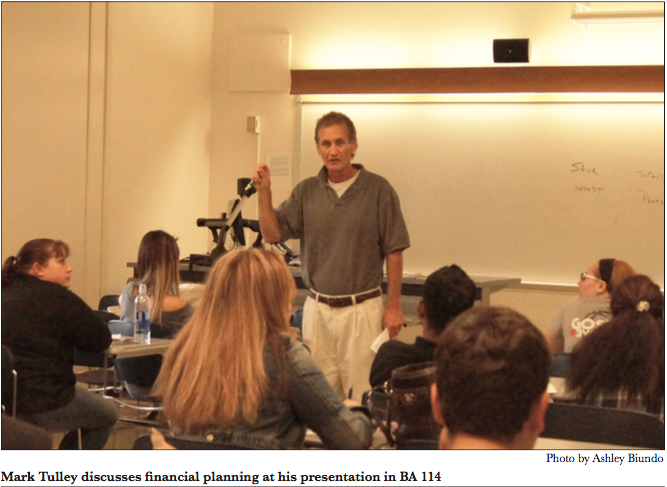Professor Mark Tulley advises students on finances while attending school
By: Dalila Kahvedzic
Editor-In-Chief
Money skills are essential for college students.
STLCC–Meramec business professor Mark Tulley has been a full time professor for 10 years after a career in securities, business and financial planning.
On Thursday Oct. 22, he held a presentation for students on how to make a paycheck last.
Tulley was on his own since he was 16 years old. He put himself through college and graduate school and worked full time.
“I worked so much that I spent a lot too, and I really wasn’t very good about budgeting. I knew I was supposed to, I just didn’t do a very good job of it. So, here’s what I did. I took 15 percent off the top of everything I ever made and saved it, put it away in savings,” Tulley said. “It worked.”
Personal financial planning requires everyone to look at the bigger picture, Tulley said.
“You really need to get a handle of where you are financially, because everything really should be driven by what your financial goals are,” Tulley said.
There are three goals: short term, medium term and long term, Tulley said.
Short term is a goal that takes less than a year to attain, something like a laptop or a vacation. Medium term would take one to five years and long term would be longer than five years.
“I try to get everyone to establish those real tangible, specific goals first and then the second thing is, alright, those are my goals, where am I financially? Can I even achieve these goals,” Tulley said.
The next step is to take a picture in time of where you are, Tulley said. This picture includes three things: past, present and future.
Past involves where your money came from and where it went. This includes sources of income whether it is a salary, gift money, interest from a bank — any and all income.
“Then try to break it up into two categories — fixed and variable. Fixed expenses are the things you have to pay — rent, car loan, etc.,” Tulley said. “If I don’t pay my car loan, they’re going to take my car away. If I don’t pay my rent, they’re going to boot me out of the apartment — I have to pay them.”
Variable expenses are things you have more control over , Tulley said.
“Variable expenses can even be utility bills because we can say ‘well, let’s make it a little colder in the apartment, let’s cut back the expenses a little bit,’” Tulley said.
For a lot of people, especially younger people, it would be scenarios such as not eating out as much, Tulley said.
“Cut the fast food, cut the entertainment,” Tulley said. “Instead of going out to eat tonight, we’ll just barbecue some hot dogs — those are ways to control your expenses.”
Fixed expenses are what people have a pretty good handle on, Tulley said. People tend to underestimate their variable expenses by about 60 percent.
“It’s because you don’t think about it,” Tulley said.
Instead of buying a small bag of chips at the vending machine for over a dollar, go to Costco and purchase a big pack to last you awhile.
“The present aspect is where are you financially right now? What do I own and what do I owe. What I own are things like my car,” Tulley said. “What do I owe? Debt. Not my bills — that is an expense. What’s your credit card debt? What’s your car debt? What’s your home debt? You still owe $5,000 on your car, you have $2,000 that you still owe on your credit cards — that’s your debt,” Tulley said. “All things you have to cover because you’re going to create problems if you don’t.”
When creditors look at you for loans, they’re going to look at those ratios, Tulley said.The future aspect is to set up a budget.
“The key to the budget is don’t make it too complicated. The goal of the budget is to do one primary thing — and that’s to achieve those objectives that we set up earlier. The goal of the budget is to make the best use of every dollar you have available, and as best as you can — to get the things you want and not waste it on other things that you really didn’t need,” Tulley said. “Look at your priorities.”
When it comes to paying bills online, there are a lot of benefits, especially the immediacey, Tulley said.
“A lot of times that helps you get your bills paid quicker. It’s going to get taken out of your bank account the next day and get paid. So that protects you from being late on your payment,” Tulley said.
The only thing you always want to be careful with in online payments is protection, Tulley said. Make sure that you are careful about it, that you do not just leave the information open; make sure you log out.
When paying bills, direct payments are not always a good choice, Tulley said.
“What happens is people don’t pay attention to it. It just gets taken out of the statement. If you have to go online and actually tell them to pay the utility company, authorize it, you’re recognizing ‘oh I paid this amount of money for my water bill or my gas bill or electric’ — you’re conscious about it, you’re controlling the payment and you’re keeping track of it,” Tulley said.
If financial responsibilities are shared between a couple, both should be financially involved, Tulley said.
“My suggestion is ‘yours, mines and ours’ so that regardless of girlfriend, boyfriend, husband or wife — whoever, when there’s a couple involved — both should be involved financially with financial issues. Even if one typically pays the bills more,” Tulley said. “‘Yours, mines and ours’ means you have your own checking, savings and investment account. I have my own checking, savings and investment account, and then we can have an ‘ours’ that pays the rent or pays the utility; something in common,” Tulley said.
Doing things this way gives each person some independence, Tulley said. It gives each person their financial identity.
“This is critical because you want to establish your own credit, your own credit history, your own credit score because you’re equally important as individuals but also when you’re a couple. So if you guys go apply for a loan together for a car or a house, etc, they’re going to look at both credit scores,” Tulley said. “What some women do, they would take on the husband’s name — like Mrs. John Smith — you don’t want to do that. You start to lose your credit identity and your credit history. You want to be parallel — you have to be independent.”
Credit cards are a good way to establish credit history and are sometimes necessary, Tulley said. For travel — to rent a car, to book a hotel room — you are going to need a credit card.
As far as number of credit cards, go slowly in this — don’t jump in total body, Tulley said.
“Put a toe in, then put a foot in and then work your way up. When you’re done, normally one of the big credit cards is probably a good idea. Like mastercard, just because they’re universal, you can use them in lots of places. One of the things you check on is what are the benefits? Some of them have good reward programs. The other would be a specialty card (for specific places) if it’s a place you go to a whole lot, you buy a lot of their product, and you get financial benefits and discounts by using it and you’re going to pay it off on time.”
The most amount of credit cards a person should have is three. When all is said and done, maybe three to cover everything, Tulley said. To spend oevr a third of the balance on the credit card is not ideal.
“One thing I tell everybody is don’t carry them all with you. It keeps you focused. Carry what you need,” Tulley said.
So long as you are paying it, so long as you have control of your finances and you are able to pay your bills on time, then a credit card should not be a problem, Tulley said.
“You should be able to use it for the convenience, use it to be able to establish credit, use it for the reward program. But the key is this — don’t pay interest. Pay the thing off in time,” Tulley said. “As long as you manage them and they don’t manage you.”











